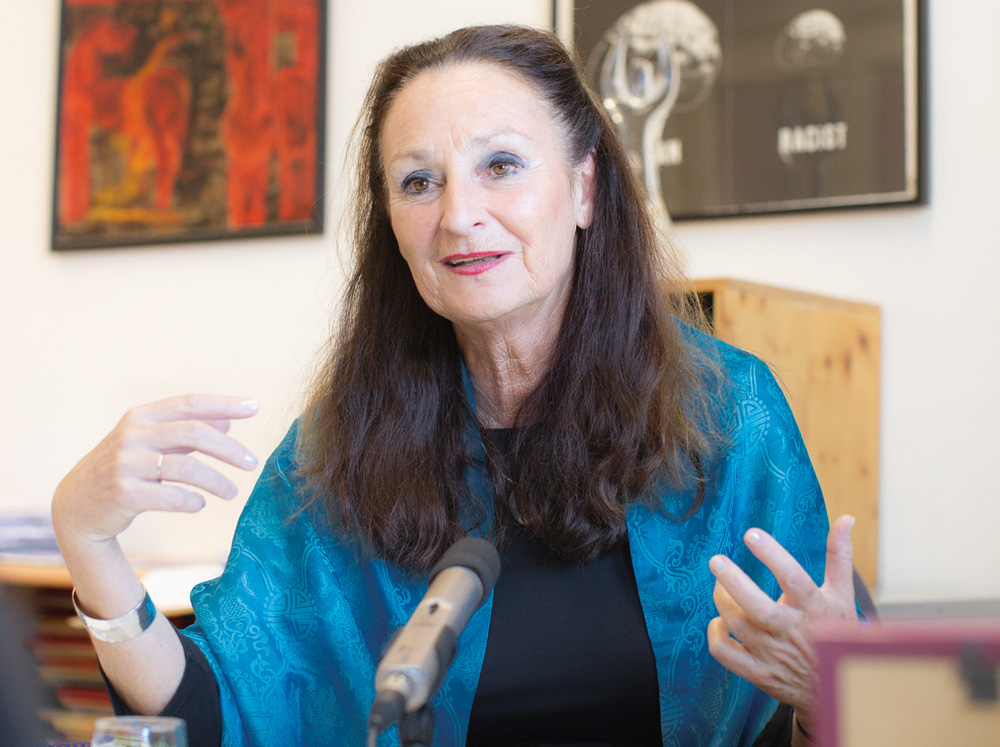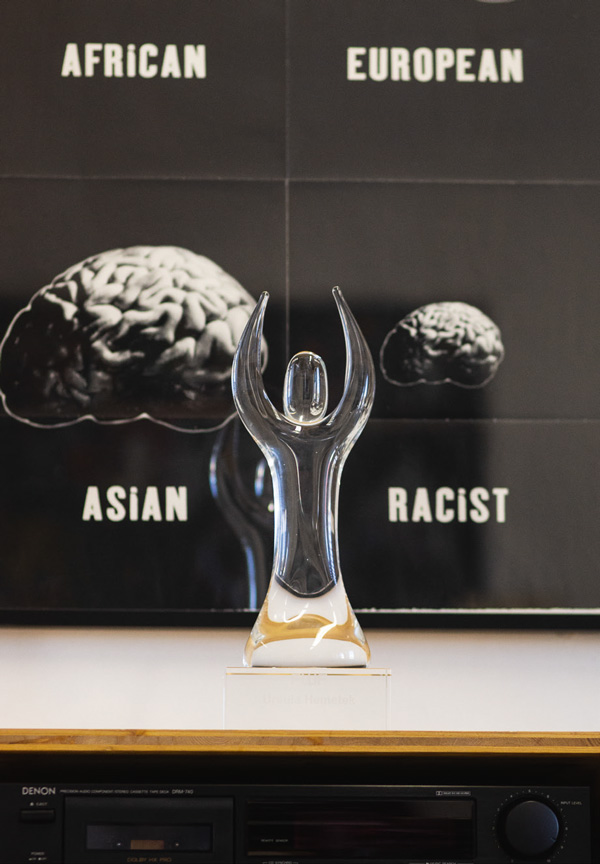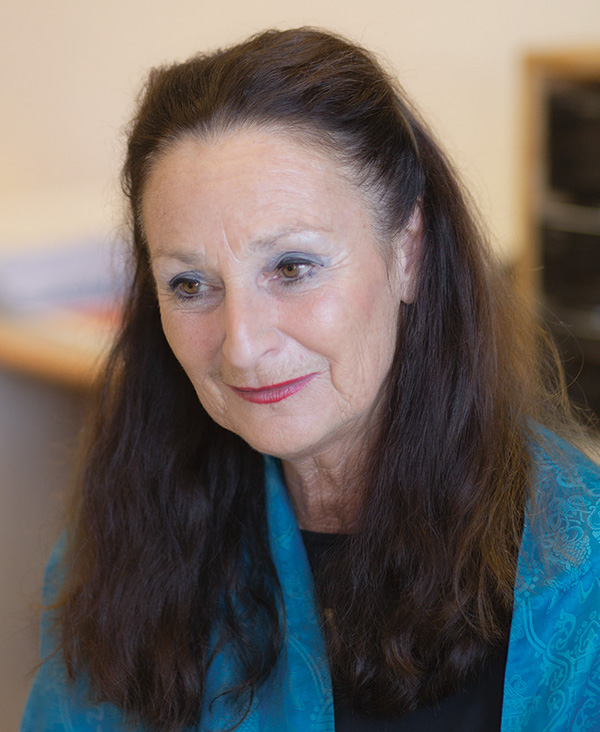Im Juni wurde die Ethnomusikologin, mdw-Professorin und Institutsleiterin Ursula Hemetek als erste Wissenschaftlerin einer Kunstuniversität mit dem Wittgenstein-Preis ausgezeichnet. Der „Austro-Nobelpreis“ ist mit 1,4 Millionen Euro dotiert. Eine Summe, die auch den mdw-Campus nachhaltig befruchten soll. Mit dem mdw-Magazin sprach die Expertin für Minderheitenforschung über Kampfgeist, Konsequenz und das Zuhören als wichtigstes Instrument in der Ethnomusikologie.

Was war ihr erster Gedanke, als Sie vom Wittgenstein-Preis erfahren haben?
Ursula Hemetek (UH): Was für eine Anerkennung für dieses Fach, ein „Orchideenfach“ wie die Ethnomusikologie! Das war meine erste Reaktion. Die meisten wissen nicht mal, was das ist. Und dann noch für ein Gebiet wie die Minderheitenforschung ausgezeichnet zu werden – das hätte ich nicht zu träumen gewagt. Etwas Besseres kann dir in einem Forscher_innenleben nicht passieren.
Ihr Institut heißt Volkmusikforschung und Ethnomusikologie. Worum geht es eigentlich?
UH: Wir beschäftigen uns mit Musik im sozialen Zusammenhang und ihrer Bedeutung für die Menschen, die sie produzieren oder konsumieren. „Ethnomusicology“ ist der international eingeführte, übergeordnete Begriff. Aber es betrifft grundsätzlich alle Musikstile der Welt, selbstverständlich auch die österreichische Volksmusik. Die Unterscheidung von Fremdem und Eigenem ist überholt. Es geht um die Methodik, die Feldforschung. Gerlinde Haid und ich haben jahrelang darüber diskutiert und schlussendlich beschlossen, zwei verschiedene Fächer – Volksmusikforschung und Ethnomusikologie – anzubieten, einfach weil die Fachtraditionen und die Geschichte so unterschiedlich sind. Das eine geht u. a. auf Herder und die spätere Nationenwerdung im 19. Jahrhundert zurück – Laien wollten der „Stimme des Volkes“ nachspüren –, das andere basiert auf der vergleichenden Musikwissenschaft und einer kolonialistischen Vergangenheit, als Menschen mit Phonographen ausrückten, um die Musik der „primitiven Völker“ aufzuzeichnen und ihr evolutionistisches Weltbild zu stützen.
Sie haben über die Musik der Burgenland-Kroat_innen dissertiert, forschen seit 1988 über Roma-Musik in Österreich und engagieren sich mit ihrer Aufklärungs- und Öffentlichkeitsarbeit. Warum?

UH: Ungerechtigkeiten haben mich immer auf die Palme gebracht. Ich bin in einer katholischen Ortschaft aufgewachsen, war aber evangelisch. Dadurch hab ich schon als Kind erfahren, was Diskriminierung bedeutet. Und dann hab ich, die Apothekerstochter, einen sogenannten „Tschuschen“ – so hat das bei uns am Land geheißen – geheiratet und hautnah erfahren, wie es meinem Mann als „Ausländer“ im Alltag geht, wenn er z. B. mit seinem Akzent eine Wohnung sucht. D. h. ich war oft eine, die aufgrund von Anderssein um ihre Position kämpfen musste. Übung ist gut und führt irgendwann zu einem professionellen Umgang mit solchen Mechanismen. Mit der Roma-Forschung wurde mir dann klar, dass die Forschung nicht primär meiner wissenschaftlichen Profilierung dienen kann, sondern auch gesellschaftspolitisch Zeichen setzen muss, wenn ich mit Menschen arbeite, die derartig diskriminiert werden. Was ich von außen sehe, ist, dass durch die Anerkennung als Volksgruppe 1993 zumindest ein rechtlicher Rahmen geschaffen wurde, um Respekt einfordern zu können. Es gibt inzwischen viele Roma-Vereine und eine junge Generation, die sich selbstbewusst zu Wort meldet. Das ist schön zu sehen.
Wie stehen Sie zu dem Hype, den Emir Kusturica und Goran Bregović in den 1990er-Jahren auslösten?
UH: Time of the Gypsies war ein Film, der wesentlicher zum Balkan-Boom beigetragen hat. Aber er hat mit manchen Musikstilen der Roma in Österreich wenig bis gar nichts zu tun. Bregović hat sich verschiedene Roma-Musikstile aus dem ehemaligen Jugoslawien angeeignet, die regional gebunden sind, und sie dann genial im Film eingesetzt. Eine künstlerisch legitime Überzeichnung, ja, aber ich kann mich erinnern, dass die Roma nicht nur glücklich waren, weil er ein stereotypes Bild gezeichnet hat, mit dem sie sich nicht identifiziert haben. Andererseits hat der Boom vielen Musiker_innen Auftrittsmöglichkeiten verschafft.
Ist es nicht problematisch, wenn „authentische“ Feldaufnahmen zur Grundlage für neue, hybride Musikstile werden?
UH: Die Balkansounds, die fragmentiert in die Diskos eingeflossen sind, meinen Sie? Also ich bewerte nicht, ich beobachte. Wichtig ist, wie die betroffenen Menschen dazu stehen. Es geht um ihre kulturellen Ausdrucksformen. Wenn Menschen ausgebeutet werden, find ich es nicht in Ordnung, aber wenn es zur Thematisierung und Popularisierung einer Volksgruppe beiträgt, find ich es gut.
Feldforschung verlangt souveränen Umgang mit der Technik …
UH: Ich habe meine Feldforschung 1978 noch mit Magnetbändern gemacht, die Aufnahmegeräte wogen damals 15 bis 20 kg. Ich musste sie über der Schulter tragen und mitmarschieren, z. B. bei den Hochzeiten, die ich dokumentiert habe. Mit den Mini-Nagras und dann dem DAT-Recorder wurde es leichter, weniger auffallend. Heute arbeiten wir mit Zoom-Geräten und setzen eine Videokamera ein. Zuletzt haben wir mit geflüchteten Jugendlichen aus Afghanistan gearbeitet und sie zu ihren musikalischen Präferenzen befragt. Eine Feldforschung, die nur mit dem Handy funktionierte, weil sie uns sofort im Netz gezeigt haben, wer ihr Star ist, was sie am liebsten hören und was das mit ihrem Leben zu tun hat. Das war eine neue Erfahrung.
Wie haben Sie die Arbeit an der mdw in den vergangenen 31 Jahren erlebt?
UH: Die Ethnomusikologie musste sich ihren Platz hier erst erkämpfen. Die Vorarbeit, andere Musikstile hereinzubringen, lag bei Walter Deutsch und der Volksmusikforschung. Ich war mit meiner vergleichenden Musikwissenschafts-Ausbildung damals, als ich an die mdw kam, die Außenseiterin. Aber der Ansatz der Applied Ethnomusicology hat meiner Entwicklung gutgetan, gerade an diesem Institut war man sehr anwendungsorientiert unterwegs. Ich wollte „identitätstragende Musik“ untersuchen. Meinen Minderheitenforschungen ist man immer relativ positiv gegenübergestanden, je nach Rektorat. Wohingegen Kolleg_innen meiner Beschäftigung mit Roma anfänglich mit Unverständnis und Vorurteilen begegnet sind. Da haben manche zu mir gesagt: „Du weißt aber schon, dass die stehlen, da musst aufpassen.“ Auf dem Niveau war der Informationsstand damals. Zu meiner ersten Lehrveranstaltung zum Thema Minderheiten im Jahr 1992 kamen viele ausländische Studierende, das wurde mit Skepsis gesehen. Aber das hat sich geändert. Heute ist unsere Uni stolz darauf, 46 Prozent ausländische Studierende zu haben. Das ist ein – auch ethnomusikologisch – großes Potenzial: Diese Studierenden bringen andere Musiksprachen mit, sind unter Umständen in anderen traditionellen Instrumenten geschult und damit die besten Mediator_innen.
Sie haben nie bereut, an einer Kunstuniversität zu sein?

UH: Nein, dieses Haus hat mir ein Dach gegeben und dafür bin ich dankbar. So konnte ich über 30 Jahre lang konsequent meinen Forschungsinteressen folgen, sie etablieren, publizieren und mein Wissen an Studierende weitergeben. Das ist nicht selbstverständlich. Was das Betreuungsverhältnis betrifft – im Vergleich zur Universität Wien, wo ich habilitiert bin und auch unterrichte, leben wir hier auf einer Insel der Seligen. Ich kann mich aufgrund der geringeren Studierendenzahlen einzelnen Studierenden richtig widmen. Und wir unterliegen nicht diesen schrecklichen Punkteevaluierungskriterien – auch wenn wir transparent und gesetzeskonform evaluieren. Noch ein Vorteil ist die hervorragende Struktur, wodurch die wissenschaftlichen Institute voneinander getrennt sind und nicht gegeneinander antreten müssen. Ethnomusikologie, Musiksoziologie, historische Musikwissenschaft, Popularmusikforschung etc. sind eigenständige Fächer. Aber natürlich gab es hier immer den Kampf um die Stellung der Wissenschaft, eben nicht nur „Nebenfach“ für die Studierenden zu sein. Mit dem Wittgenstein-Preis ist der Stellenwert nun gestärkt.
Welche Pläne verfolgen Sie mit dem Preisgeld?
UH: Ich möchte ein Forschungszentrum für ethnomusikologische Minderheitenforschung gründen. Dieser inzwischen weltweit etablierte Ansatz soll einen Ort bekommen. Die Universität hat mir Räume zugesagt. Es wird jedenfalls eine eigene Organisationseinheit, die sich ausschließlich der Forschung widmet und getrennt ist vom Institut für Volksmusikforschung und Ethnomusikologie, wo ja auch die Lehre wesentlich ist. Über den Namen denken wir noch nach. Die Nachhaltigkeit soll durch Prä- und Postdoc-Stellen gesichert sein. Andererseits will ich eng mit NGOs zusammenarbeiten, weil mir die gesellschaftspolitische Umsetzung von Forschungsergebnissen immer wichtig war. Es soll ein lebendiges, internationales Forschungszentrum werden, das auch nach den ersten fünf finanziell gesicherten Jahren weiter bestehen soll, was die Einwerbung von Drittmitteln nötig machen wird.
Werden Sie dann noch zum Forschen kommen?
UH: Das ist die große Frage. Ich lehre, ich publiziere, ich bin universitätspolitisch tätig – und wann forsche ich? Andererseits ermöglicht diese Einbindung, ein Fach zu platzieren, was ich erfolgreich getan habe. Unser Institut ist von drei auf 13 Personen gewachsen. Das ist nicht nichts. Es gilt international als eine der wichtigsten Einrichtungen für Ethnomusikologie. Wir sind auch dank unserer Publikationen und Öffentlichkeitsarbeit sichtbar. Das war wohl auch ein Grund, warum ich 2017 Generalsekretärin des ICTM (International Council for Traditional Music) geworden bin. Aber es ist ein Dilemma. Ich habe viel geforscht in den letzten 30 Jahren, habe eine riesige Sammlung von Tondokumenten und schau oft und gerne zurück.
Meine Aufgabe am Forschungszentrum liegt meiner Meinung nach jedenfalls darin, die Dinge inhaltlich zusammenzufassen, Synergien herzustellen und jungen Forscher_innen eine Chance zu geben. Wir müssen an der Theorie- und Methodenbildung arbeiten. Roma-Musik soll ein Thema werden, denn dazu sehe ich nicht viele Forschungsarbeiten. Und zu aktuellen politischen Themen, zu Geflüchteten etwa, werden wir auch sicher Projekte machen. Aber ansonsten will ich mich noch nicht festlegen.
Mit Ihnen sind es jetzt, seit 1986, fünf Preisträgerinnen. Wo stehen Frauen heute in der akademischen Welt?
UH: Als ich dissertiert habe, hat es noch geheißen: „Es kommt mir keine weibliche Assistentin über die Schwelle.“ Das hat sich Gott sei Dank geändert. Aber es ist ein ständiger Kampf. In puncto Gender-Sensibilisierung hab ich viel von meinen jungen Kolleg_innen, insbesondere Marko Kölbl, mitgenommen. Es fängt mit der Sprache an. Die Diskriminierungserfahrung, die hab ich, die braucht mir niemand beibringen, aber der Umgang damit und die Wachsamkeit, schon in der Wortwahl herauszuhören, wie der Ansatz des Gegenübers ist, das hab ich gelernt.
Worauf sollten Frauen in der Wissenschaft achten?
UH: Frauen sollten darauf achten, sich Respekt zu verschaffen und zwar mit allen Mitteln, die eine Universität im organisatorischen Rahmen zur Verfügung stellen muss, d. h. sich nichts gefallen lassen und sofort zu reagieren, wenn es zu irgendeinem abwertenden Verhalten kommt. Da setzt unser Haus neue Maßstäbe. Und im wissenschaftlichen Bereich: Sich von einem Thema nicht abbringen lassen. Das ist ganz wichtig. Bereit sein zuzuhören und zu lernen. Nicht mit dem Kopf durch die Wand, sondern sich Menschen suchen, die weiterhelfen und einen fördern können. Und sich diesen Menschen gegenüber dann auch loyal verhalten.
Welche Eigenschaften haben Ihren Erfolg in der Wissenschaft befördert?
UH: Ich bin ein neugieriger Mensch und höre anderen Menschen wahnsinnig gern zu. Ich finde Lebensgeschichten, die mir erzählt werden, nicht mühsam, sondern wirklich spannend. Und Feldforschung ist für mich sowieso der schönste Teil dieser Wissenschaft. Was mir sicher geholfen hat, ist meine soziale Kompetenz und dass ich sehr gut selbstorganisiert bin. Das verdanke ich meinen Kindern. Grundsätzlich war es wichtig, konsequent bei einem Thema zu bleiben, das mir wichtig war: die Minderheiten.

